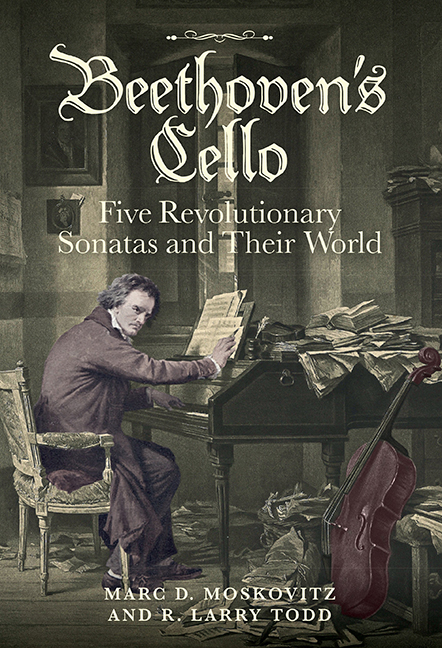Book contents
- Frontmatter
- Dedication
- Epigraph
- Contents
- Illustrations
- Foreword by Steven Isserlis
- Preface
- Personalia
- 1 From Bonn to Berlin
- 2 Music Fit for a King: The Sonata in F major Op. 5 No. 1 (1796)
- Interlude: Beethoven's Cellos
- 3 Tragic/Comic Masks: The Sonata in G minor Op. 5 No. 2 (1796)
- Interlude: Beethoven's Pianos
- 4 Themes and Variations
- Interlude: The Triple Concerto as Outlier
- 5 Friendship, War, Tears, and Grief: The Sonata in A major Op. 69 (1808)
- 6 Freedom and Control: The Sonata in C major Op. 102 No. 1 (1815)
- 7 ‘Most Remarkable and Strange’: The Sonata in D major Op. 102 No. 2 (1815)
- Interlude: Arranged Sonatas
- 8 Opus Posthumum
- Appendix 1 Primary Sources of Beethoven's Music for Cello and Piano
- Appendix 2 Reviews of Beethoven's Cello Music by His Contemporaries
- Notes
- Bibliography
- Index of Works by Beethoven
- General Index
7 - ‘Most Remarkable and Strange’: The Sonata in D major Op. 102 No. 2 (1815)
Published online by Cambridge University Press: 18 April 2018
- Frontmatter
- Dedication
- Epigraph
- Contents
- Illustrations
- Foreword by Steven Isserlis
- Preface
- Personalia
- 1 From Bonn to Berlin
- 2 Music Fit for a King: The Sonata in F major Op. 5 No. 1 (1796)
- Interlude: Beethoven's Cellos
- 3 Tragic/Comic Masks: The Sonata in G minor Op. 5 No. 2 (1796)
- Interlude: Beethoven's Pianos
- 4 Themes and Variations
- Interlude: The Triple Concerto as Outlier
- 5 Friendship, War, Tears, and Grief: The Sonata in A major Op. 69 (1808)
- 6 Freedom and Control: The Sonata in C major Op. 102 No. 1 (1815)
- 7 ‘Most Remarkable and Strange’: The Sonata in D major Op. 102 No. 2 (1815)
- Interlude: Arranged Sonatas
- 8 Opus Posthumum
- Appendix 1 Primary Sources of Beethoven's Music for Cello and Piano
- Appendix 2 Reviews of Beethoven's Cello Music by His Contemporaries
- Notes
- Bibliography
- Index of Works by Beethoven
- General Index
Summary
`AMONG THE WOMEN who touched Beethoven's life, Marie Erdödy held a particular significance. Born Anna Marie Niczky, the seventeen-yearold Romanian became a countess upon marrying the Hungarian Count Peter Erdödy in 1796. She remained a countess even though by 1805 the couple had separated. Johann Friedrich Reichardt, a prolific composer of some 1500 Lieder and an author of ‘intimate letters’ of musical journalism, spent the winter of 1808–09 in Vienna, where he attended soirées at Erdödy's residence. He described her as a ‘very small, pretty, delicate lady of twenty-five … afflicted since her first confinement with an incurable malady’, which rendered her bedridden for much of her life. A competent pianist, Marie was nevertheless forced to limp ‘from one pianoforte to another, her feet being still much swollen’, and yet, despite her infirmity, she maintained a cheerful disposition. The mother of three children, she is remembered today principally on account of her connection to Beethoven: she admired his music deeply and remained one of his most faithful friends and patrons. Whether or not their relationship ever tested the bounds of platonic warmth, Beethoven clearly found a kindred spirit in Marie, whom, according to Schindler, he fondly regarded as his Beichtvater, or father confessor.
In 1808, when Beethoven threatened to take up a position in Cassel under the newly installed King of Westphalia, Napoleon's brother Jérôme Bonaparte, the countess, along with Ignaz von Gleichenstein, negotiated an annuity for Beethoven subsidized by Archduke Rudolph and Princes Lobkowitz and Kinsky and helped persuade the composer to remain in Vienna. He accepted too her offer to take up lodging at her Krugerstrasse residence, although here their friendship suffered the breach that routinely, it seems, disrupted the majority of Beethoven's relationships. Upon learning that Erdödy had been paying his manservant ‘not inconsiderable sums of money’, Beethoven stormed out and took up rooms elsewhere. Happily, the rift with the countess repaired itself, and their relationship was restored. Subsequently Beethoven honored her in 1808 with the dedication of the two Piano Trios Op. 70, composed while he was living under her roof.
- Type
- Chapter
- Information
- Beethoven's Cello: Five Revolutionary Sonatas and Their World , pp. 146 - 169Publisher: Boydell & BrewerPrint publication year: 2017



